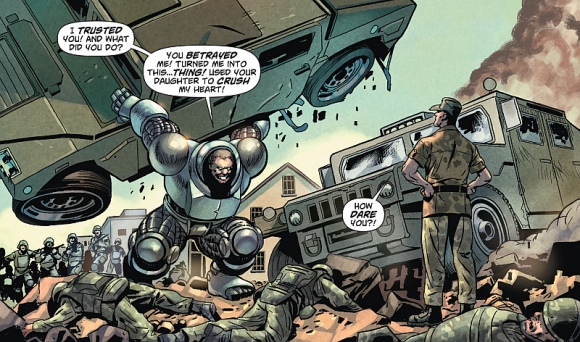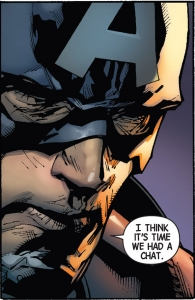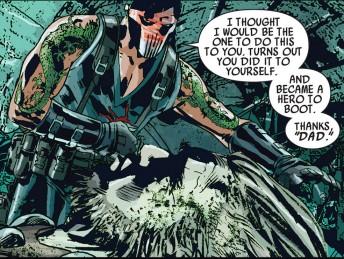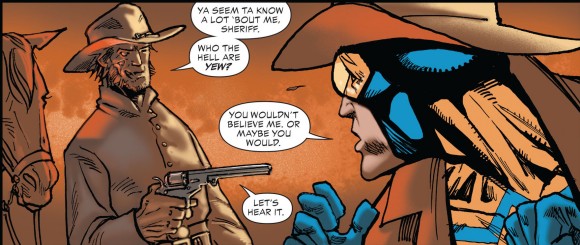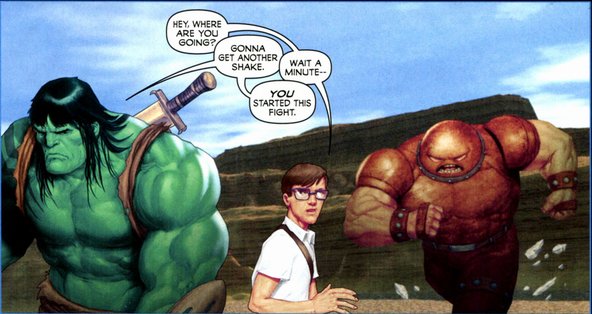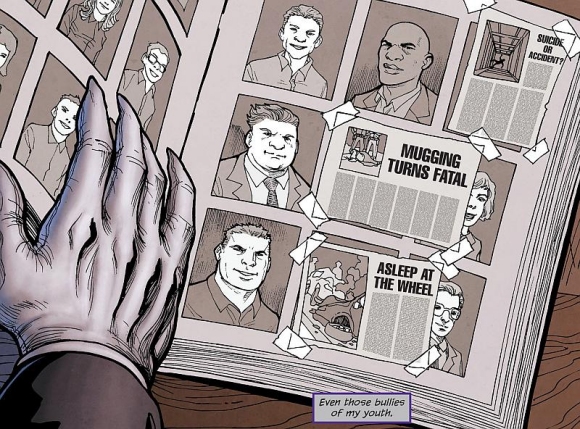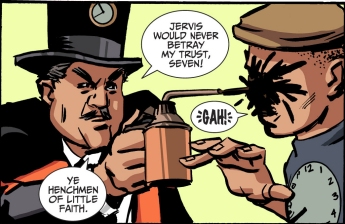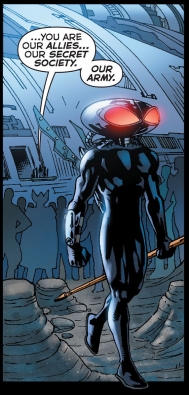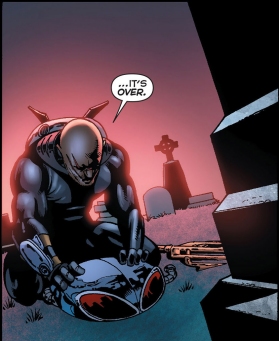For Janelle Monae’s Metropolis, a series of albums which in turn contain suites that tell the story of Cindi Mayweather, a robot sent from the future to restore freedom and love, the apocalypse brought with it stifling social mores, unbearable rules, and emotionally-devastating limits on personal expression. It gave us a squeaky clean Pleasantville at the expense of everything that makes us who we are.
Janelle Monae as Cindi Mayweather, and sometimes just Janelle Monae, has a lot to say to you, fellow citizen. Here she is on “Lettin’ Go”:
Oooh! I got a call today, from my job up the block
It was my boss to say, “You know we like you a lot
But we don’t need you, J, you daydream too much!”
Well, man, I’m glad y’all let me go!
’cause with no 9 to 5, it’s a brand new day!
My rent’s due but I’m a party any way!
I feel so alive, stress just faded away!
It’s time to live my own life!
Getting fired sucks, but she sees it as an opportunity, not a tragedy. It’s something that puts her closer to her goal, so she’s going to take it in stride. The stress came from not following her dream and living her own life, right?
On “Sincerely, Jane” after listing a litany of problems with how we live, she exhorts us to be better:
Are we really living or just walking dead now?
Or dreaming of a hope riding the wings of angels?
The way we live, the way we die
What a tragedy, I’m so terrified
Daydreamers, please wake up
We can’t sleep no more
On “Tightrope,” a collab with her longtime associate Big Boi of OutKast, she digs right into it:
Some people talk about you
Like they know all about you
When you get down they doubt you
And when you tipping on the scene
Yeah they talkin’ about it
‘Cause they can’t tip all on the scene with you
What you talk about it
Talkin’ about it
When you get elevated,
They love it or they hate it
You dance up on them haters
Keep getting funky on the scene
While they jumpin’ round you
They trying to take all your dreams
But you can’t allow it
People are going to hate on you, and the proper response is to dance all up on them. You let your glow do the talking. The point is that you do have dreams, but your dreams are being taken from you. You’re meant to keep your dreams closer and damn the consequences.
“QUEEN,” featuring Erykah Badu, opens with a punch:
They call us dirty ’cause we break all your rules down
And we just came to act a fool, is that all right (Girl, that’s alright)
They be like, “Ooh, let them eat cake.”
But we eat wings and throw them bones on the ground
Monae wants you to know exactly who she’s talking about through the android metaphor: it’s us, the normal people, the people with restrictions imposed upon us that we just can’t abide. We don’t play that aristocrat stuff over here. That’s not our life. I like that the music video is explicitly presented as being about how Monae and Badu created works of art that are repellent to the restrictive, oppressive future:
She’s got a few bits in here that sound like rhetorical questions, but they aren’t, not if you listen closely.
Is it peculiar that she twerk in the mirror?
And am I weird to dance alone late at night?
And is it true we’re all insane?
And I just tell ’em, “No, we ain’t,” and get down!
She’s not willing to argue any of these points. She’s just explaining to the person giving her grief about being who she is that she doesn’t care what they have to say. Is it crazy that we’re like this? No, of course it isn’t. None of this matters, no one else’s approval matters, because she’s going to do whatever she wants and have her a good old time. The booty don’t lie, because it knows what it’s meant to do. It has purpose, and that purpose is to dance. And that is true of Monae-as-Mayweather, too. She has a purpose. And you don’t get to stop it.
I like that she positions dancing as a weapon, in addition to being fun. Dancing is one of those things that’s often seen as a corruptive influence by puritans and squares. It’s about sex and getting to do whatever you want, no matter how illogical. This is closer to being a sexual and love-oriented revolution than a violent uprising. She makes it plain on this excerpt from a skit called “Good Morning, Midnight” on The Electric Lady:
Woah, woah, woah! That’s that ignorant rusty-dusty nano-thinking nonsense I been warning y’all about. Please stay away from fools like that. Love not war, we’re tired of fires, quiet no riots, we are jamming, dancing and loving. Don’t throw no rock, don’t, break no glass just shake your ass. Ooh just shock it shake it baby with the Electric Lady. Here at 105.5 WDRD.
But you get my point—Janelle Monae makes motivation music, and she’s doing it through a classic type of sci-fi story to do it. The Electric Lady, the latest release in Metropolis, parts four and five of seven. I’m having trouble picking a favorite song on this album, because though I like a few of them more than others, they all sound so good to me in context with each other that I couldn’t pick if I wanted to. The front of the album is weaker than the back half, but the back half has bangers, too.
I talk a lot about Young Jeezy over Lex Luger beats is black superhero music. And it is, or it was back when Jeezy was the man on these streets. Because Jeezy was talking about rising above, or having risen above, and doing incredibly exciting things with an iller-than-it-needed-to-be flow. Jeezy, at his height, is music to flex to.
But Monae’s motivation music is cut-a-rug music. You want to bounce, you bob, you tap your foot. I like the video for “Dance Apocalyptic” a lot, because at first you think it’s kind of a “Hey Ya!” riff:
which is super tight if you believe the totally untenable idea that Killer Mike is following in Big Boi’s footsteps and Monae stepped into Andre’s shoes, but honestly it’s just cool because it’s really cool. It’s well done. But if you think about what you know about those music performances in the context of The Electric Lady , you might realize that she’s spreading love and freedom through a format that was once considered harmful for teens because it got them all worked up with all the gyrating and such. Nothing’s an accident. You’re listening to a story.
, you might realize that she’s spreading love and freedom through a format that was once considered harmful for teens because it got them all worked up with all the gyrating and such. Nothing’s an accident. You’re listening to a story.
Like the X-Men at their very best, Monae’s Cindi Mayweather represents all of us. She is dancing for all of us. She’s a messianic figure because she is meant to show us the way to brightening our lives, and through our lives, the world. It’s not necessarily afrofuturism, I don’t think, but she’s definitely doing that sci-fi thing of talking about the modern day through a very thinly-veiled metaphor.
Cindi Mayweather is here to save us all. But maybe we ain’t worth saving.
An early single from Doris , Odd Future Wolf Gang Kill Them All’s resident superlyrical dude Earl Sweatshirt’s highly-anticipated album, was “Chum.” Here’s a chunk of the first verse, and the music video, too:
, Odd Future Wolf Gang Kill Them All’s resident superlyrical dude Earl Sweatshirt’s highly-anticipated album, was “Chum.” Here’s a chunk of the first verse, and the music video, too:
It’s probably been twelve years since my father left, left me fatherless
And I just used to say I hate him in dishonest jest
When honestly I miss this nigga, like when I was six
And every time I got the chance to say it I would swallow it
Sixteen, I’m hollow, intolerant, skipped shots
I storm that whole bottle, I’ll show you a role model
I’m drunk pissy, pissing on somebody front lawn
Trying to figure out how in the fuck I missed moderate
And the first half of this kicks my guts out, and the flash-forward to sixteen hits bone. Doris isn’t a story like The Electric Lady, but it is a picture. It’s what Earl chose to reveal on wax, a point of view he has developed as filtered through music. That POV probably isn’t 100% Earl, but that doesn’t matter. What matters is that it’s here, and we can look at it, and we can figure out what kind of picture Earl is painting.
Earl’s Doris is post-apocalypse too, and this apocalypse brought with it a different kind of emotional devastation. Where Monae’s audience are suppressed, Earl’s are depressed, wobbling under the weight of the world. They’re depressed because nothing can be trusted, not girlfriends, as on “Pre”:
Dealt with addiction, fell for the bitch with the
Pale butter skin who just packed up and dipped
not his perception, as on “Sunday”:
All my dreams got dimmer when I stopped smoking pot
Nightmares got more vivid when I stopped smoking pot
And loving you is a little different, I don’t like you a lot
You see, it seems like
and definitely not his city, as on “Hive”:
From that city that’s recession-hit
With stress, niggas could flex metal with peddle to rake pennies in
Desolate testaments trying to stay Jekyll-ish
But most niggas Hyde and Brenda just stay pregnant
Breaking news: death’s less important when the Lakers lose
It’s lead in that baby food, heads try to make it through
Fish-netted legs for them eyes that she cater to
Ride dirty as the fucking sky that you praying to
Stress kills, and he smokes an incredible amount of weed, which is actually not surprising on “20 Wave Caps,” which features supersmoker Domo Genesis:
Smoking ’til I’m loopy as a motherfucking toucan
20 minutes, burn a fucking quarter back to two grams
and he can’t even trust himself, as on “Burgundy,” which opens with Vince Staples letting him know that nobody cares how he feels, they just want raps:
My grandma’s passin’
But I’m too busy tryin’ to get this fuckin’ album crackin’ too see her
So I apologize in advance if anything should happen
And my priorities fucked up, I know it, I’m afraid I’m gonna blow it
And all them expectations raising because daddy was a poet, right?
Talk all you want I’m takin’ no advice
I’m a sucker for all of this stuff pretty much, from the dadraps to the sadraps. And I think Earl is pretty great at it, and it’s down to both his lyrics but also something in his voice. He sells the frown better than most guys do. Drake can do it, but there’s no hint of opulence behind Earl’s words. Drake had it and lost it, but Earl never had it. The city’s dying and everything’s rotten inside.
Earl paints a vivid picture, and I’ve been spinning Doris pretty much since I got it, with A$AP Ferg’s Trap Lord being the previous winner and Monae’s The Electric Lady being the latest. There’s something about Earl’s lyrics, and Monae’s lyrics, that keep me thinking about the songs and mulling over lines until they take crystal-clear shape, and it’s for entirely different reasons.
being the previous winner and Monae’s The Electric Lady being the latest. There’s something about Earl’s lyrics, and Monae’s lyrics, that keep me thinking about the songs and mulling over lines until they take crystal-clear shape, and it’s for entirely different reasons.
Monae wants us to rise up from the mud. Earl makes us follow him through it. It’s frustration music, that kind of thing you put on so you can say “Bruh, I don’t fuck with no cops” or feel bad about your absentee father or just narrow your eyebrows and put a mean look on your face. Earl’s stuck, and we’re stuck alongside him. He’s not going to be doing any dancing any time soon, and really, he talks about his vices like they’re burdens, too. He’s doing what he can to cope and keep his head above water, but that doesn’t mean that he’s thriving. He’s getting by. He’s maintaining maybe. But even that can slip. And then it’s a wrap.
“Muddy” is how Doris feels to me, but without any of the negative connotations “muddy” might bring with it. It’s slow head nod music, something to vibe to or relax to, but not necessarily something I would want to drive around to, even though I bet it sounds amazing coming out of a trunk. It’s a downer, but a pointed one. Earl’s lyrics and the music are both gonna wear at you, but they feel good when you’re in a foul mood. It lets you focus that black cloud over your head onto something other than yourself for a minute. And that’s necessary.
Monae and Earl are both talking about us as we live today. They just have different points of view on what we need to do to survive. Dancing is catharsis, but moping and spewing venom can be cathartic, too. Monae wants you to know that there is a brighter day, a better way. You can dog on her all you want, you can raise your voice all you want, but you do not have a say in her life. She’s going to do her thing, and in so doing, show us the path to Heaven. Earl, though. He has no interest in saving anyone, not even himself, but the act of just telling his story is enough to tell somebody else “You’re not alone.” When he said that he used to say he hated his father in dishonest jest, but couldn’t work up the nerve to just say he misses him, that kind of thing is heart-stopping. I know what that feels like.
Monae is salvation. Earl is confirmation.
Two sides of an argument. Both well worth listening to.







